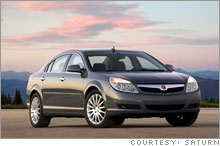NEW YORK (CNNMoney.com) -- General Motors revealed two drivable concept cars with new engines that burn gasoline in virtually the same way that a diesel engine burns diesel fuel.
The engines will get 15-percent better fuel economy than ordinary gasoline engines, GM estimates, but will not need the expensive exhaust treatment that diesel engines require.
 |
| GM is revealing the fuel saving diesel-like gasoline engine in a version of the Saturn Aura. |
Several car companies have been working on this type of engine technology, commonly known as homogeneous charge compression ignition, or HCCI. The technology promises the fuel economy of a diesel engine, which is typically much more efficient than a gasoline engine, but with the much cleaner exhaust of a gasoline engine.
In an HCCI engine, gasoline is ignited inside the cylinder using compression and the engine's own heat without the need of a spark. This is the same way that a diesel engine ignites diesel fuel. (When the engine is first started, and until it warms up, GM's HCCI engine still uses a spark to ignite the fuel.)
This type of ignition results in more energy to propel the vehicle because the fuel burns with less heat and light, which wastes energy, and because there is more compression when the fuel is ignited and, therefore, more of a push when the fuel and air expand.
"I remember debating the limits of combustion capability when I was in college," Tom Stephens, group vice president, GM Powertrain and Quality, said in a company statement. "HCCI was just a dream then. Today, using math-based predictive analysis and other tools, we are beginning to see how we can make this technology real."
The vehicles GM showed Friday are a Saturn Aura and an Opel Vectra, two virtually identical mid-sized sedans, both equipped with 180-horsepower 2.2-liter four cylinder HCCI engines.
They can drive at up to roughly 55 miles per hour using diesel-like ignition but will have to rely on traditional spark ignition at higher speeds or under heavy loads, GM said.
"Perhaps the biggest challenge of HCCI is controlling the combustion process," said Dr. Uwe Grebe, executive director for GM Powertrain Advanced Engineering.
Engineers hope to increase operating range under HCCI and improve performance under cold weather and high-altitude conditions, the company said. 